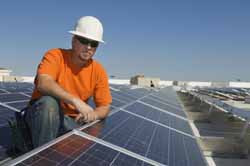Crack-resistant solar cells
Continuing reductions in the cost of crystalline silicon PV cells are being compromised by damages caused by thermal strain. This occurs at the interface between the increasingly thinner silicon wafers and the PV ribbon. The latter is a tinned copper conductor installed in solar panels, soldered directly on the silicon crystal to interconnect solar cells. To solve the problem of damaged PV cells, researchers initiated the EU-funded project 'Development of ultra soft copper conductors for crystalline silicon solar photovoltaic applications' (SOLARSOFT)(opens in new window). Project members developed a high-purity copper conductor that is on par with conventional forms of power generation in terms of cost. SOLARSOFT partners generated models for strain created during soldering of tinned copper to silicon and for copper cold deformation and annealing. Another model was used to show the effects of plasma annealing on copper grain size that was quantitative enough to define process variables. A grain size of around 70 micrometres for non-porous copper was found to provide the required low material proof stress. As such, project partners investigated rapid annealing processes that could achieve such large grain sizes at a commercially viable rate. Project work involved development of a new prototype plasma annealer. The tinning process was chemical-free and flux-free. Analysis of the initial product from the prototype indicated that the annealed material had proof stress less than 50 MPa. However, the yield strength increased above 60 MPa during tinning and spooling. Tighter control on tin bath composition and copper entry temperature removed hardening with larger spools and take-up systems being used to reduce that source of hardening. The success of SOLARSOFT should enable the European solar industry to compete more effectively with the main global players by providing a cheaper, cleaner and more advanced product. In addition, it can facilitate the decentralisation of power-generation devices and ease congestion on the electricity grid by promoting PV use.







